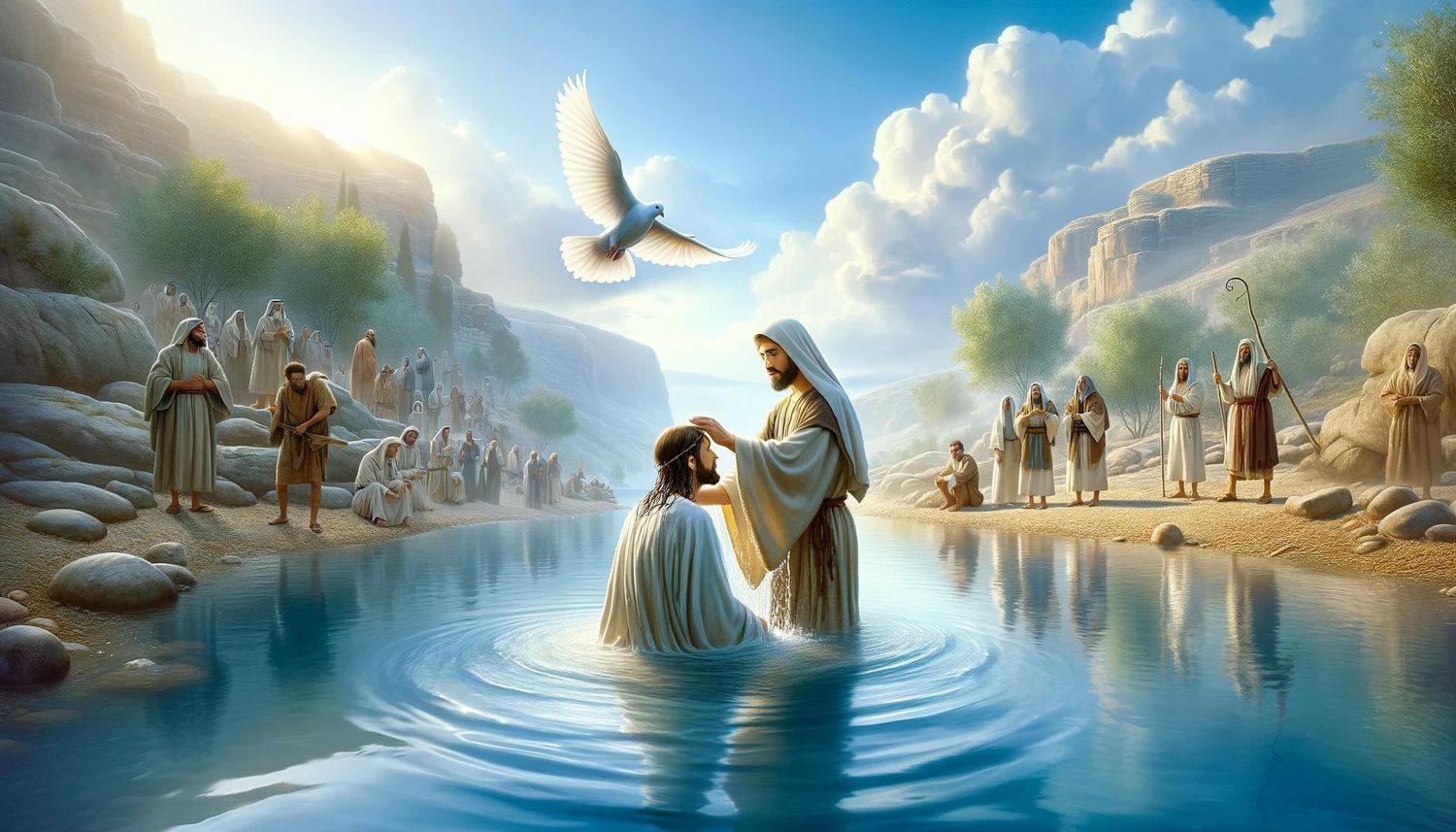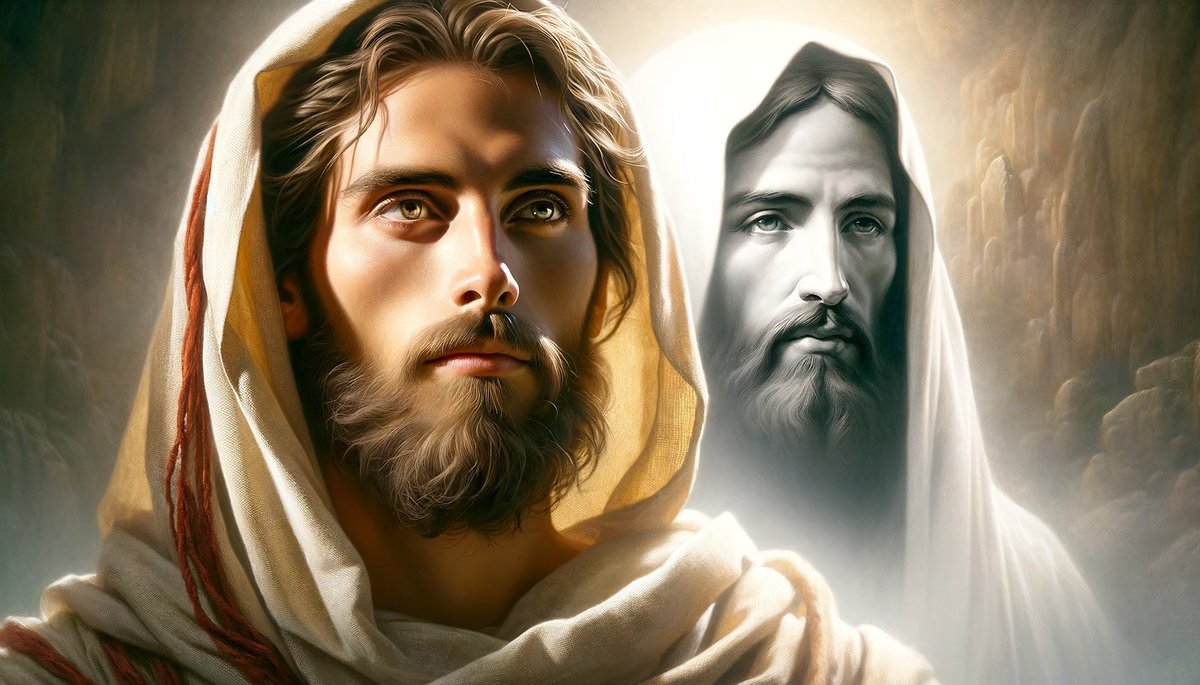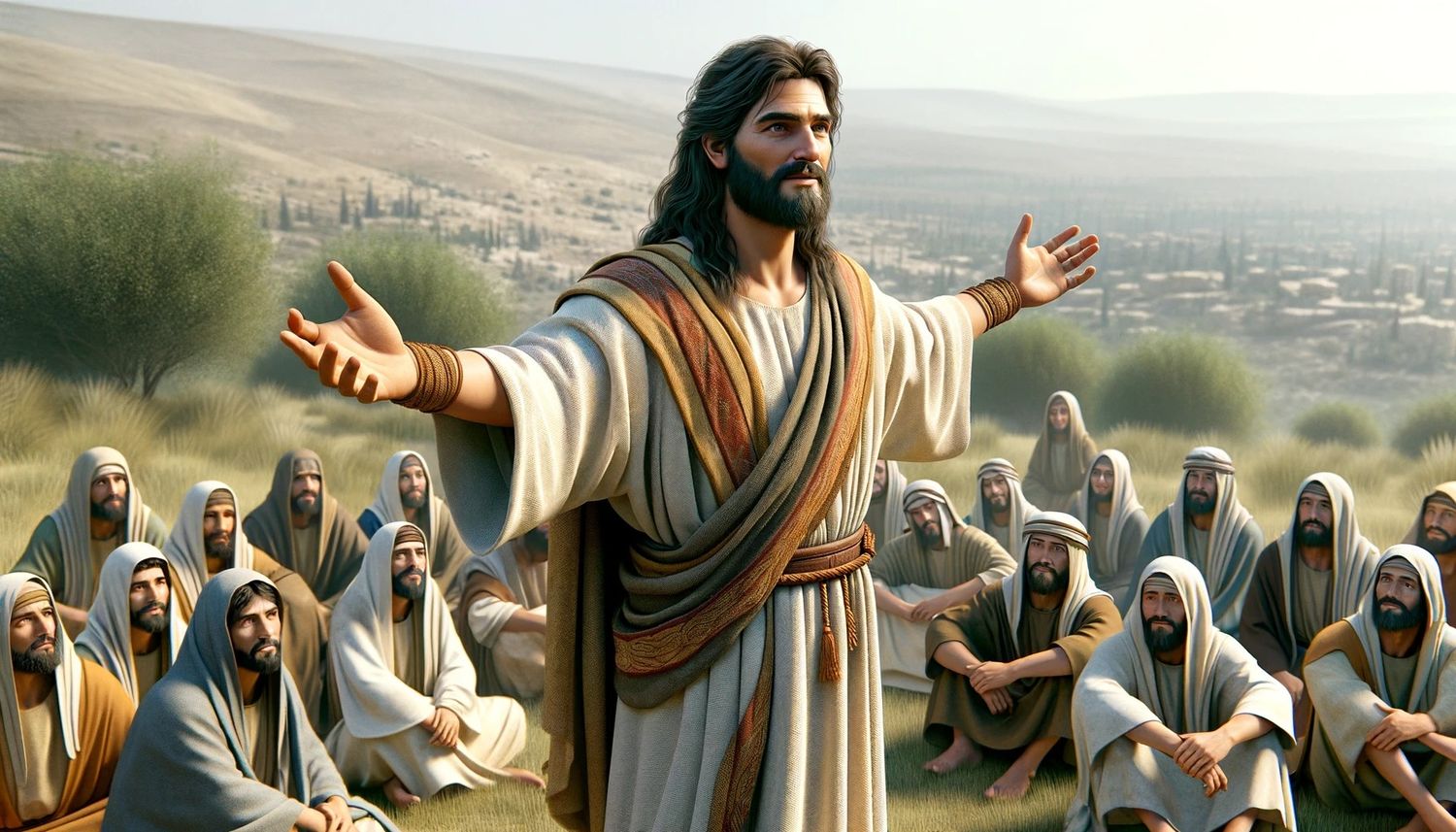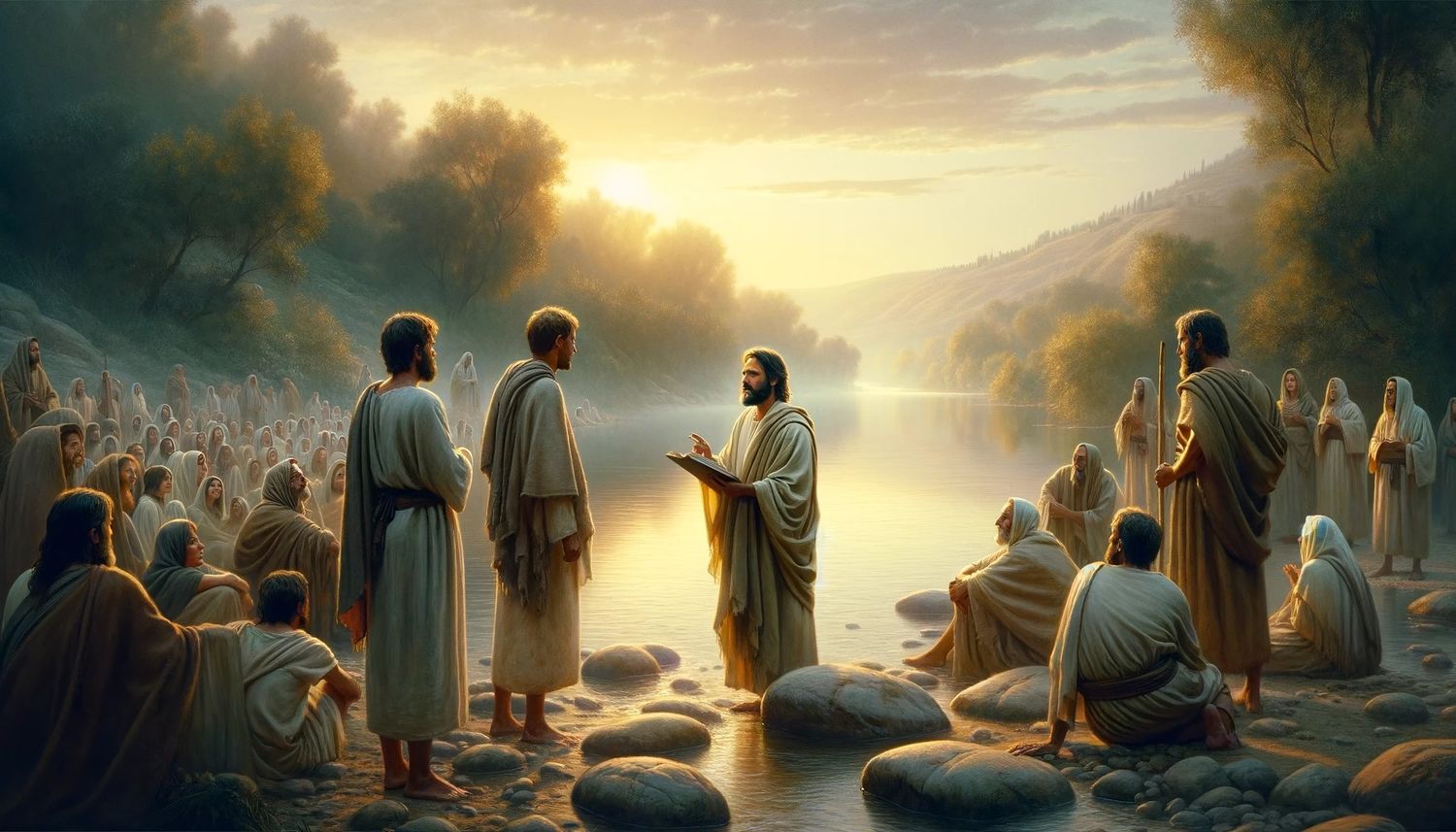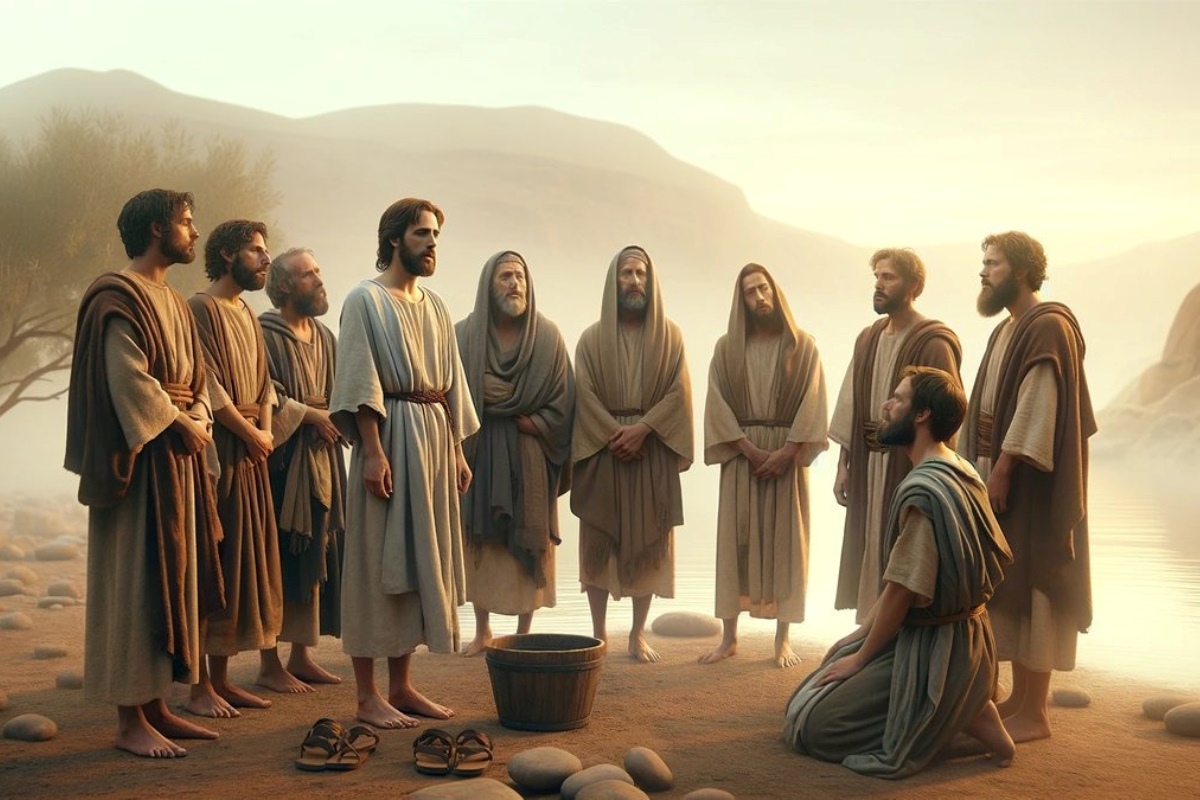Home>Christian Videos>Bible Stories>Who Was Older, Jesus Or John The Baptist
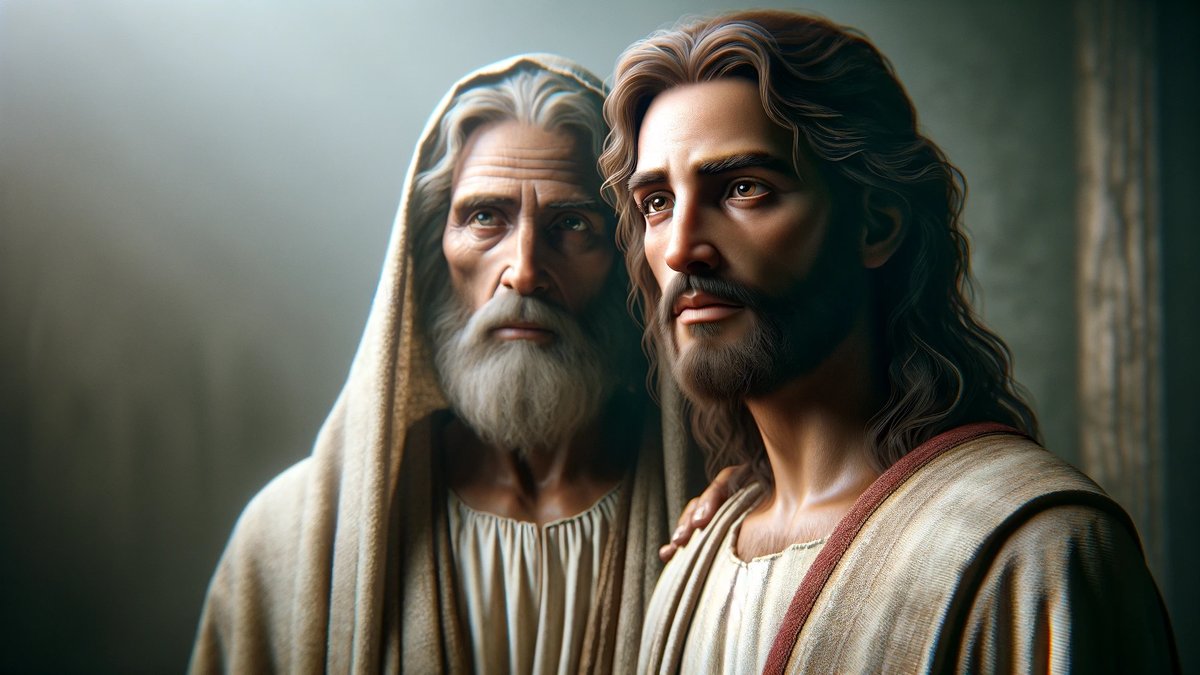

Bible Stories
Who Was Older, Jesus Or John The Baptist
Published: March 6, 2024
Jason DeRose, Managing Editor at Christian.net, uses his expertise in religion and journalism to deepen understanding of faith's societal impacts. His editorial leadership, coupled with a strong academic background, enriches the platform’s diverse content, earning him recognition in both journalism and religious circles.
Discover the age difference between Jesus and John the Baptist in this intriguing Bible story. Uncover the truth about who was older and the significance behind it. Explore more Bible stories on our site.
(Many of the links in this article redirect to a specific reviewed product. Your purchase of these products through affiliate links helps to generate commission for Christian.net, at no extra cost. Learn more)
Table of Contents
Introduction
Who was older, Jesus or John the Baptist? This question has intrigued many people over the years. The answer to this question provides insight into the relationship between these two important figures in religious history. In this article, we will explore the birth, ministry, and death of both Jesus and John the Baptist to uncover the truth about their ages and the significance of their roles in the Christian faith. Let's delve into the fascinating story of these two influential individuals and unravel the mystery of their age difference.
Read more: Who Was Older Jesus Or John The Baptist
The Birth of John the Baptist
John the Baptist, also known as John the Forerunner, was born to Zechariah, a priest, and his wife Elizabeth. The couple was well advanced in years and had been unable to conceive a child. However, an angel appeared to Zechariah and announced that Elizabeth would bear a son, who would be named John. This miraculous announcement came as a surprise to Zechariah, who was initially skeptical due to their old age. As a result of his disbelief, he was struck mute until the day of John's birth.
Despite their old age, Elizabeth conceived and gave birth to John, fulfilling the prophecy of the angel. John's birth was a joyous occasion, and it was accompanied by miraculous events, including the restoration of Zechariah's speech. This miraculous birth marked the beginning of John the Baptist's extraordinary life and his pivotal role in preparing the way for the coming of Jesus Christ.
- John the Baptist was born to Zechariah and Elizabeth, a couple who had been unable to conceive due to their old age.
- An angel appeared to Zechariah, announcing that Elizabeth would bear a son named John.
- Zechariah's initial disbelief resulted in him being struck mute until the day of John's birth.
- Despite their old age, Elizabeth conceived and gave birth to John, fulfilling the angel's prophecy.
- John's birth was accompanied by miraculous events, including the restoration of Zechariah's speech.
The miraculous circumstances surrounding John the Baptist's birth set the stage for his extraordinary life and his significant role in the religious narrative.
The Birth of Jesus
The birth of Jesus is a well-known and celebrated event in Christian tradition. According to the Gospel of Luke, Jesus was born in the town of Bethlehem during the reign of King Herod. His mother, Mary, was a virgin who conceived through the Holy Spirit. The angel Gabriel appeared to Mary, announcing that she would give birth to a son who would be called the Son of the Most High. This miraculous conception and birth fulfilled the prophecy of Isaiah, emphasizing the divine nature of Jesus' birth.
Mary and her husband, Joseph, traveled to Bethlehem for the census, and it was there that Jesus was born in a humble manger. The birth of Jesus was accompanied by extraordinary signs, including the appearance of a host of angels who proclaimed the good news to shepherds in the fields. The shepherds then visited the newborn Jesus, confirming the fulfillment of the prophecies regarding the Messiah's birth.
The birth of Jesus, heralded as the Savior and the fulfillment of ancient prophecies, holds immense significance in Christian belief. It marks the beginning of the life of Jesus, who would later become a central figure in the Christian faith and whose teachings and actions would profoundly impact the course of human history.
- Jesus was born in Bethlehem during the reign of King Herod.
- His mother, Mary, conceived through the Holy Spirit and gave birth to Jesus, fulfilling the prophecy of Isaiah.
- Jesus' birth took place in a humble manger in Bethlehem, and it was accompanied by the appearance of a host of angels who proclaimed the good news to shepherds.
- The birth of Jesus is considered the fulfillment of ancient prophecies and holds immense significance in Christian belief.
The Relationship Between Jesus and John the Baptist
The relationship between Jesus and John the Baptist is a significant aspect of Christian history and theology. John the Baptist is often regarded as the forerunner or precursor to Jesus, preparing the way for the coming of the Messiah. According to the Gospels, John the Baptist baptized Jesus in the Jordan River, marking the beginning of Jesus' public ministry. This act of baptism symbolized the passing of the mantle from John to Jesus, signifying the transition from the old covenant to the new covenant.
John the Baptist recognized the divine nature of Jesus and proclaimed him as the "Lamb of God who takes away the sin of the world." He acknowledged that Jesus was the one whose sandals he was unworthy to untie, emphasizing the superiority of Jesus' ministry. Despite his own following and influence, John humbly deferred to Jesus, recognizing him as the long-awaited Messiah.
The relationship between Jesus and John the Baptist was characterized by mutual respect and divine purpose. While John prepared the hearts of the people for the arrival of Jesus, Jesus affirmed the significance of John's role in fulfilling the prophecies of the Old Testament. Their relationship exemplifies humility, obedience to divine calling, and the interconnectedness of their missions in the grand narrative of salvation.
- John the Baptist baptized Jesus in the Jordan River, marking the beginning of Jesus’ public ministry.
- John recognized the divine nature of Jesus and proclaimed him as the “Lamb of God who takes away the sin of the world.”
- Despite his own following and influence, John humbly deferred to Jesus, recognizing him as the long-awaited Messiah.
- The relationship between Jesus and John the Baptist exemplifies humility, obedience to divine calling, and the interconnectedness of their missions in the grand narrative of salvation.
The Ministry of John the Baptist
John the Baptist's ministry was characterized by a powerful message of repentance and preparation for the coming of the Messiah. He preached in the wilderness of Judea, calling people to turn away from their sins and be baptized as a symbol of their commitment to a renewed life. John's message resonated with the people, drawing crowds from Jerusalem, Judea, and the surrounding regions to hear his prophetic proclamation.
John's attire and lifestyle reflected his dedication to his ministry. He wore clothing made of camel's hair and a leather belt around his waist, reminiscent of the prophet Elijah. His diet consisted of locusts and wild honey, emphasizing his separation from worldly comforts and his single-minded focus on his divine calling.
The baptism administered by John symbolized a spiritual cleansing and readiness for the arrival of the Messiah. It was a public declaration of one's desire to turn away from sin and embrace a transformed life. Many people, including tax collectors and soldiers, responded to John's message and sought baptism as a tangible expression of their repentance.
John's ministry also attracted the attention of religious leaders and authorities, who questioned his identity and authority. When asked if he was the Messiah, John humbly declared that he was not the Christ but the one who prepared the way for the Christ. He emphasized the superiority of the coming Messiah, stating that he was unworthy to even untie the sandals of the one who was to come.
The impact of John the Baptist's ministry extended beyond his preaching and baptizing. His bold condemnation of the religious elite and his call for genuine repentance challenged the status quo and stirred hearts across the region. His unwavering commitment to his mission and his willingness to confront societal injustices and moral decay left a profound impression on those who encountered his message.
John the Baptist's ministry set the stage for the arrival of Jesus and the subsequent proclamation of the kingdom of God. His fervent call to repentance and his recognition of the Messiah's imminent arrival paved the way for the transformative work that Jesus would accomplish. The ministry of John the Baptist serves as a powerful example of unwavering dedication to divine purpose and the profound impact of preparing the hearts of people for the coming of the Savior.
Read more: How Older Was John The Baptist Than Jesus
The Ministry of Jesus
The ministry of Jesus, often referred to as the "public life" of Jesus, began with his baptism by John the Baptist in the Jordan River. Following his baptism, Jesus embarked on a transformative journey of teaching, healing, and proclaiming the arrival of the kingdom of God. His ministry was characterized by compassion, miracles, and profound teachings that challenged societal norms and religious traditions.
Jesus' ministry encompassed various aspects, each reflecting his divine mission and the fulfillment of ancient prophecies. He traveled throughout the region, preaching the message of repentance, love, and the imminent arrival of the kingdom of God. His teachings, often conveyed through parables, conveyed profound spiritual truths and ethical principles that continue to inspire and guide millions of people worldwide.
Central to Jesus' ministry was his demonstration of compassion and healing. He performed numerous miracles, including restoring sight to the blind, healing the sick, and even raising the dead. These miraculous acts served as tangible manifestations of God's power and love, offering hope and restoration to those in need.
Jesus' ministry also involved challenging the religious authorities of his time, confronting hypocrisy, and advocating for justice and mercy. He emphasized the importance of humility, forgiveness, and the inclusive nature of God's kingdom, transcending societal barriers and welcoming all who sought spiritual renewal.
Throughout his ministry, Jesus gathered a group of disciples who accompanied him, witnessed his teachings and miracles, and eventually became instrumental in spreading his message after his crucifixion and resurrection. His interactions with his disciples, as well as with individuals from diverse backgrounds, exemplified his commitment to nurturing spiritual growth and fostering a community of faith.
The culmination of Jesus' ministry led to his sacrificial death on the cross, followed by his resurrection, which affirmed his divinity and the victory over sin and death. The transformative impact of Jesus' ministry continues to resonate across cultures and generations, shaping the core beliefs and practices of Christianity.
Jesus' ministry serves as a profound example of selfless service, unwavering commitment to truth, and the embodiment of divine love. His teachings and actions continue to inspire individuals to seek spiritual renewal, cultivate compassion, and strive for a world characterized by justice, mercy, and reconciliation.
The Death of John the Baptist
The death of John the Baptist is a tragic and significant event in the biblical narrative. John had gained widespread recognition and influence due to his powerful preaching and unwavering commitment to his divine mission. However, his bold condemnation of King Herod Antipas' unlawful marriage to Herodias, the wife of his brother, incurred the wrath of Herodias. She harbored deep resentment towards John for publicly denouncing her relationship with Herod.
During a lavish banquet held by Herod to celebrate his birthday, Herodias' daughter, Salome, captivated the king with her dancing. In a moment of impulsive promise, Herod vowed to grant her any request, up to half of his kingdom. Prompted by her mother, Salome requested the head of John the Baptist on a platter. Although deeply grieved, Herod, bound by his oath and the pressure of his guests, reluctantly ordered the execution of John.
John the Baptist's death was a martyrdom, a testament to his unwavering commitment to truth and righteousness. His willingness to confront the abuses of power and the moral decay of society ultimately led to his tragic demise. The news of John's death spread sorrow and mourning among his followers and those who had been profoundly impacted by his message of repentance and preparation for the coming of the Messiah.
The death of John the Baptist serves as a poignant reminder of the cost of speaking truth to power and the enduring legacy of those who courageously uphold their convictions, even in the face of persecution and adversity. His martyrdom further underscores the interconnectedness of his mission with the unfolding narrative of Jesus' ministry and the ultimate sacrifice that would bring redemption to humanity.
The Death of Jesus
The death of Jesus, known as the crucifixion, is a pivotal event in Christian theology and history. According to the Gospels, Jesus was betrayed by one of his disciples, Judas Iscariot, and subsequently arrested by the religious authorities. He was subjected to a series of trials, during which false accusations were brought against him. Despite the lack of evidence, Jesus was sentenced to death by crucifixion, a form of execution reserved for the most severe offenses.
The crucifixion of Jesus took place at Golgotha, also known as the "place of the skull." He was nailed to a wooden cross alongside two criminals, fulfilling the prophecies regarding the suffering of the Messiah. The crucifixion was a brutal and agonizing form of punishment, intended to serve as a deterrent and a public spectacle of shame.
During his crucifixion, Jesus endured immense physical and emotional suffering. He was mocked, ridiculed, and subjected to intense pain as he hung on the cross. Despite his anguish, Jesus demonstrated compassion and forgiveness, praying for those who persecuted him and extending grace to the repentant criminal crucified beside him.
The death of Jesus on the cross is central to the Christian faith, representing the ultimate act of sacrificial love and atonement for humanity's sins. It is believed that through his death, Jesus bore the weight of human transgressions and reconciled humanity with God, offering the promise of redemption and eternal life.
The significance of Jesus' death is further underscored by the events that followed. According to the Gospels, darkness covered the land, and the temple curtain was torn in two, symbolizing the removal of barriers between God and humanity. Jesus' final words, "It is finished," affirmed the completion of his redemptive work and the fulfillment of divine purpose.
The death of Jesus, though marked by suffering and sorrow, ultimately paved the way for the triumph of the resurrection. His crucifixion is a profound demonstration of selfless love and the willingness to endure suffering for the sake of others. The impact of Jesus' death reverberates throughout history, offering hope, forgiveness, and the assurance of God's unending grace.
Conclusion
In conclusion, the question of who was older, Jesus or John the Baptist, unveils a deeper understanding of their intertwined roles in the narrative of Christianity. John the Baptist, born to elderly parents through divine intervention, prepared the way for the ministry of Jesus, baptizing him and recognizing his divine nature. Jesus, born of the Virgin Mary and heralded as the fulfillment of ancient prophecies, embarked on a transformative ministry that challenged societal norms and offered hope and healing to the masses. The deaths of both John the Baptist and Jesus, marked by martyrdom and sacrificial love, further underscore their profound impact on the course of human history and the Christian faith. The age difference between Jesus and John the Baptist, while not explicitly stated in the scriptures, serves as a testament to the interconnectedness of their missions and the fulfillment of divine purpose. Their lives and teachings continue to inspire and guide millions of believers, shaping the core tenets of Christian belief and offering a message of redemption, compassion, and unwavering faith.
